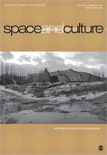
Space and Culture
Scope & Guideline
Exploring the Intersections of Space and Society
Introduction
Aims and Scopes
- Interdisciplinary Exploration of Space:
The journal encourages contributions that span multiple disciplines, examining how spatial practices intersect with cultural, social, and political dimensions. - Critical Urban Studies:
A core focus is on urban environments, analyzing the dynamics of urbanization, gentrification, and the role of public spaces in fostering community engagement. - Materiality and Sensory Experience:
Research often emphasizes the material aspects of space and the sensory experiences associated with them, exploring how these influence social interactions and cultural practices. - Social Justice and Inclusion:
The journal highlights issues of social justice, particularly regarding marginalized communities, and how spatial arrangements can either perpetuate or challenge inequalities. - Play and Creativity in Urban Spaces:
There is a significant interest in the role of play, creativity, and informal practices in reshaping urban spaces and fostering community interactions.
Trending and Emerging
- Spatial Justice and Equity:
As urbanization continues to present challenges, there is an increasing focus on spatial justice, addressing how urban spaces can be designed and utilized to enhance equity and inclusivity. - Digital and Geomedia Spaces:
The intersection of digital technologies and urban spaces is becoming a prominent theme, exploring how digital media shapes our understanding and experience of space within cities. - Public Health and Urban Space:
In light of recent global health crises, there is a rising interest in examining how urban spaces can be designed or modified to promote public health and well-being. - Playful Urban Interventions:
Research on playful design and interventions in urban settings is trending, highlighting how play can transform public spaces and foster community engagement. - Environmental and Ecological Perspectives:
Emerging studies are increasingly addressing environmental issues within urban contexts, focusing on how spatial practices can contribute to sustainability and ecological resilience.
Declining or Waning
- Traditional Architectural Analysis:
There has been a noticeable decline in papers focused strictly on traditional architectural analysis without contextual cultural or social implications, as the journal shifts towards more interdisciplinary approaches. - Historical Perspectives on Space:
Research that solely focuses on historical perspectives without connecting them to contemporary issues or current spatial practices seems to be less prevalent, indicating a move towards more applied studies. - Static Notions of Space:
The journal is moving away from static definitions of space, focusing instead on dynamic interactions and lived experiences, which suggests a waning interest in rigid spatial classifications. - Overly Theoretical Frameworks:
There appears to be a decrease in the publication of papers that rely heavily on abstract theoretical frameworks without empirical grounding, as the journal seeks to emphasize practical implications and real-world applications.
Similar Journals
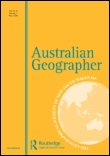
AUSTRALIAN GEOGRAPHER
Redefining Perspectives on Australian GeographyAUSTRALIAN GEOGRAPHER, published by Routledge Journals, Taylor & Francis Ltd, is a leading scholarly journal that captures the dynamic and multifaceted field of geography. With an ISSN of 0004-9182 and an E-ISSN of 1465-3311, this peer-reviewed journal has a long-standing tradition, dating back to its origins between 1928 and 1929, and is essential for those engaged in cutting-edge research in Earth-Surface Processes and Geography, Planning and Development. Recognized for its academic rigor, the journal holds a prestigious Q1 ranking in both Earth-Surface Processes and Geography categories as of 2023. Furthermore, its Scopus rankings underscore its influence, placing it in the top 30% of its field. Although it does not currently offer Open Access, AUSTRALIAN GEOGRAPHER remains a critical platform for presenting significant geographic research and fostering academic dialogue, making it indispensable for researchers, professionals, and students eager to contribute to the evolving landscape of geographic scholarship.
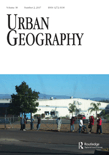
URBAN GEOGRAPHY
Empowering Scholars to Reimagine Urban SpacesURBAN GEOGRAPHY, published by Routledge Journals, Taylor & Francis Ltd, is a leading interdisciplinary journal that has been at the forefront of urban studies since its inception in 1980. With an impact factor that positions it in the prestigious Q1 category in both Geography, Planning and Development and Urban Studies, this journal is recognized for its rigorous research that informs policy and practice in urban environments. With a Scopus ranking of #20 out of 279 in the field of Urban Studies and #79 out of 821 in Geography, Planning and Development, it offers valuable insights for scholars, professionals, and students alike—enhancing our understanding of the complex dynamics that shape urban spaces. URBAN GEOGRAPHY is pivotal for those looking to advance their expertise in urban analytical frameworks, urbanization trends, and sustainable development strategies. Submissions are welcomed from a diverse range of perspectives, making it a vital resource for anyone invested in the future of urban landscapes.

Revista Geoaraguaia
Bridging Geography, Sociology, and Environmental StudiesRevista Geoaraguaia, published by UNIV FEDERAL MATO GROSSO, is an esteemed open-access journal dedicated to advancing research in the field of human and social sciences. Based in Brazil, this journal facilitates scholarly communication and fosters interdisciplinary approaches, exploring topics that encompass geography, sociology, and environmental studies. Although specific metrics like H-Index and impact factor are not listed, the journal is committed to providing a platform for innovative research that addresses pressing societal challenges. Researchers, academics, and students will find a rich repository of articles that not only contribute to theoretical frameworks but also enhance practical applications in various settings. By connecting local and global issues, Revista Geoaraguaia plays a crucial role in promoting academic discourse and advancing knowledge in the vibrant landscape of Latin American studies.
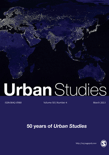
URBAN STUDIES
Uncovering the Future of Cities: Research that MattersURBAN STUDIES, published by SAGE Publications Ltd, stands as a premier journal in the field of urban studies and environmental science, evidenced by its prestigious Q1 ranking in both categories for 2023. With an ISSN of 0042-0980 and an E-ISSN of 1360-063X, this UK-based journal has been disseminating pivotal research since its inception in 1964, and will continue to do so until 2024. As a leader in the social sciences, it ranks #11 out of 279 in the field of Urban Studies and #15 out of 219 in Environmental Science, achieving remarkable percentiles of 96% and 93% respectively. Although not an open-access journal, URBAN STUDIES provides a platform where scholars, practitioners, and students can engage with cutting-edge research, critical analyses, and innovative solutions addressing the complexities of urban environments. By publishing studies that encompass economic, social, and environmental dimensions of urbanization, the journal contributes significantly to the discourse on sustainable development and urban planning.
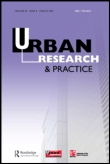
Urban Research & Practice
Advancing Knowledge for Sustainable Urban FuturesUrban Research & Practice is a premier academic journal published by Routledge Journals, Taylor & Francis Ltd, dedicated to the interconnected fields of Urban Studies and Geography, Planning and Development. Established in 2008, this journal has rapidly established itself as a vital resource, achieving a Q1 category ranking in both fields as of 2023, demonstrating its leading role in shaping contemporary urban research. With a Scopus ranking that places it within the top 20% of journals in Urban Studies and the top 22% in Geography, it attracts high-impact contributions from scholars and practitioners alike. Although it currently does not offer Open Access options, the journal is committed to disseminating innovative research that addresses the complex challenges of urban environments, fostering insights that are essential for informed decision-making and sustainable urban development. Researchers, professionals, and students will find comprehensive analyses, case studies, and theoretical explorations that enrich the understanding of urban dynamics in today's ever-evolving landscapes.

Urbano
Pioneering Insights in Urban StudiesUrbano is a distinguished academic journal published by UNIV BIO-BIO, DEPT PLANIFICACION & DISENO in Chile, specializing in Urban Studies. With the ISSN 0717-3997 and E-ISSN 0718-3607, it has been committed to open-access publishing since 2000, aiming to disseminate vital research and insights that contribute to the dynamic field of urban planning and design. The journal's impressive trajectory includes acceptance into Scopus, featuring a 2023 ranking of #162 out of 279 in the Urban Studies category, placing it in the 42nd percentile. Urbano serves as a platform for innovative ideas and interdisciplinary approaches, inviting researchers, practitioners, and students to engage with high-quality content from 2016 to 2024. By addressing contemporary urban challenges, it not only enriches academic discourse but also actively supports the development of sustainable urban environments across Latin America and beyond.
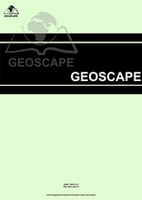
GeoScape
Navigating the complexities of geography and conservation.GeoScape is a distinguished open-access journal published by SCIENDO, operating since 2006 and aimed at fostering knowledge in the fields of Ecology, Geography, Urban Studies, and Nature and Landscape Conservation. Based in Warsaw, Poland, the journal maintains a robust academic presence with an impact factor reflective of its quality, prominently positioned in the Q3 category for multiple significant subject areas as of 2023. With its commitment to disseminating high-quality research, GeoScape holds notable Scopus rankings, including a rank of #94 in Urban Studies and #213 in Ecology, signifying its contribution to environmental science discussions. The journal serves as an essential resource for researchers, professionals, and students seeking to advance their understanding of contemporary ecological challenges and urban development in an accessible format.
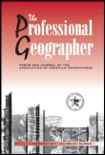
PROFESSIONAL GEOGRAPHER
Elevating the Discourse in Geography and Earth SciencesPROFESSIONAL GEOGRAPHER is a prominent journal in the fields of geography and earth-surface processes, published by Routledge Journals, Taylor & Francis Ltd. With a rich history dating back to 1949 and continuing through 2024, it serves as a vital platform for researchers, professionals, and students to explore and disseminate groundbreaking research and insights within the geographical sciences. The journal holds a respectable impact factor, placing it in the Q2 quartile for both Earth-Surface Processes and Geography, Planning and Development as of 2023, highlighting its importance in these critical academic areas. The journal ranks #273 out of 821 in Geography and Planning and #70 out of 179 in Earth and Planetary Sciences on Scopus, reflecting its robust contribution to advancing knowledge in social sciences. Although it does not currently offer open access options, it still provides invaluable content that influences pedagogy and research in geography. Its comprehensive scope invites a wide range of geospatial topics, encouraging interdisciplinary dialogue and collaboration across the global academic community.

Geograficidade
Illuminating the Complexities of Geographic PhenomenaGeograficidade is an esteemed academic journal published by the Federal University of Fluminense in Brazil, focusing on the interdisciplinary fields of geography, spatial analysis, and environmental studies. With its ISSN 2238-0205, this journal serves as a crucial platform for researchers, professionals, and students to disseminate innovative research, theoretical discussions, and practical applications pertaining to geographic phenomena. Although currently not listed as open access, Geograficidade aims to make significant contributions to the understanding of geographic dynamics and their implications on societal and environmental issues. The journal emphasizes the importance of rigorous scholarship and encourages submissions that explore contemporary geographical challenges and promote sustainable solutions. Its vibrant community of scholars fosters a rich dialogue, making Geograficidade a vital resource for anyone engaged in geographic research and academia.
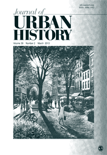
JOURNAL OF URBAN HISTORY
Bridging History and Urban LifeJournal of Urban History is a leading academic publication dedicated to the exploration and analysis of urban development, culture, and society, published by SAGE Publications Inc.. Established in 1974, this influential journal has successfully bridged the gap between the fields of history, sociology, and urban studies, with a commendable Q1 ranking in History as of 2023, signifying its prominence and rigorous scholarship in the discipline. The journal's scope encompasses a diverse range of topics pertinent to urban life, making it essential reading for researchers, professionals, and students eager to understand the complexities of urban spaces throughout history. With its mission to disseminate high-quality research and foster academic dialogue, the Journal of Urban History continues to thrive as a vital resource within the academic community, contributing to informed discussions on urban issues and shaping the future of urban studies. While currently not an open-access journal, it remains accessible through various academic libraries and institutions. For readers interested in delving into urban narratives and their historical context, this journal is an invaluable asset in the quest for knowledge and understanding.